As Uganda is faced with a devastating new wave of COVID-19 cases, its fragile health system on the brink of collapse and running out of oxygen, and its President imposing a strict 42-day national lockdown, the Ugandan government risks excluding many of its poorest from life-saving emergency relief. At the heart of this human rights scandal is the push by the government to tie emergency cash transfers to the dysfunctional national digital ID, colloquially referred to as Ndaga Muntu by Ugandans.
A few days after President Museveni announced a long, national, lockdown on June 18, his new Prime Minister, Robinah Nabbanja, said that the Ugandan government would provide emergency cash transfers to the country’s most vulnerable during this health crisis.
The government on July 8 began distributing cash transfers primarily via mobile money accounts, but much remains unclear about the targeting of the most vulnerable. Government representatives have said that they will rely on data by the National Identification and Registration Authority (NIRA), which administers the national biometric ID, to confirm who gets support. In an interview on television, the Prime Minister said: “It is easy to monitor MTN and Airtel [mobile money providers]—it is easy. We are going to use NIRA data, we already have most Ugandans on board, and it is easier than monitoring food.” In subsequent interviews, the Prime Minister confirmed that NIRA data will be used to determine those eligible for emergency cash transfers, and a press release issued by the Ministry of Gender, Labour and Social Development on June 29 indicated that the National Identity Number or NIN would be used to help identify individuals.
If the goal is truly to reach vulnerable Ugandans, targeting those in need is certainly not as easy as the Prime Minister believes—especially if the Government of Uganda is relying on data from its national digital ID system. In a damning report we released earlier this month, titled Chased Away and Left to Die, we estimated that as many as one third of the adult population of Uganda have not yet been successfully registered with NIRA. This means that millions of Ugandans are not included in the national biometric ID, which the government has called a ‘national security weapon’ that has been operated under the watchful eyes of Uganda’s powerful military leaders, and have nether a National Identity Number nor a National Identity Card.
Our research shows that it has been especially difficult for marginalized groups to successfully enrol in the ID. This includes those living in poverty, older persons, people with disabilities, women, and those living in remote areas. The result is that many of those most in need during the current crisis will be shut out of any program that relies on data held by NIRA, an underfunded government authority that has been plagued by failures and allegations of corruption and bribery. To rely on the national ID system for COVID-19 emergency relief knowing the severe dysfunction it faces is tantamount to criminal negligence.
And this is not the first time that the government of Uganda has tried to link its faltering digital ID system to efforts to curb the pandemic. In March, the government attempted to restrict access to (limitedly available) COVID-19 vaccines to people who could present their national ID card. Only after our organizations sued the government, arguing that this would prevent many vulnerable Ugandans without national IDs from accessing the vaccine, did the government relent and allow for alternative forms of identity documents to be used.
The biometric ID is already mandatory to access many government services in Uganda and our recent report recounts myriad cases of the devastating effects for those who are excluded. Bleeding pregnant women have been chased away from health centers because they could not produce an ID card. Tens of thousands of older persons over the age of 80 continue to be denied access to the Senior Citizens’ Grant, a cash transfer, because there are errors on their national ID cards or they have been unable to successfully register with NIRA. Exclusion from the national ID has truly become a matter of life and death. As one interviewee told us about those being denied healthcare for failure to show the ID, “Many people fall sick and stay home and die.”
What is more, by delivering emergency cash transfers primarily via mobile accounts the Ugandan government is building extra layers of exclusion into its proposed relief efforts. In Uganda, the national digital ID is required for registration of SIM cards, meaning that those without a national ID are also unable to register the SIM card necessary for using a mobile phone. And according to the 2018 National IT Survey by Uganda’s National Information Technology Authority (NITA), only 71% of the Ugandan population owned a mobile phone to begin with, a figure that was lower in rural areas and lower for women.
We support efforts to deliver emergency aid in these horrific times, and cash transfers are an effective tool to mitigate the effects of the current pandemic-induced economic crisis in Uganda. But by hinging emergency COVID-19 relief on the national digital ID system, the Government risks deepening the exclusion, discrimination and other human rights issues that have plagued this system from the start. At a time when vulnerable Ugandans desperately need money to survive, the current plans are immoral and insufficient, and the onus is on the government to pivot to a better, more effective plan.
We call on the Ugandan government, as well as international organizations like the World Bank and the IMF who have supported emergency measures in Uganda earlier in this pandemic, to make sure that COVID-19 relief efforts do not further exclude poor and marginalized groups. Targeting of COVID relief should be transparent, and government should be held accountable for decisions on who receives aid. If not, it is a virtual guarantee that many poor and marginalized individuals in Uganda will be left to die during this harrowing phase of the pandemic.
The article was authored by Unwanted Witness Uganda team led by CEO Dorothy Mukasa
Do you have a story in your community or an opinion to share with us: Email us at editorial@watchdoguganda.com














